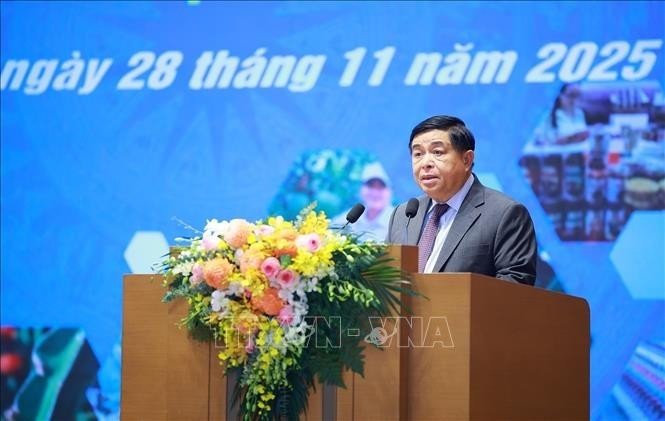In his opening speech, Dung said the event aimed to propose strategic orientations and breakthrough solutions for the development of the collective economy and cooperatives, an indispensable component of the socialist-oriented market economy. It was also to convey sympathy to residents, cooperatives, and businesses hit by recent natural disasters.
He highlighted the event’s practical focus on achieving parallel growth in both private and collective sectors, noting that cooperation between cooperatives and enterprises has moved far beyond traditional models and now drives value-chain integration across agriculture, industry, tourism and services.
The most concrete proposal came from Deputy Minister of Agriculture and Environment Vo Van Hung: a landmark agricultural insurance policy designed to cut red tape, hasten decentralisation, and enshrine formal benefit- and risk-sharing contracts among corporations, cooperatives, and farmers.
He called for nationwide expansion of standardised raw material zones on the back of the ongoing one-million-ha low-emission and high-quality rice farming project in the Mekong Delta. He also recommended training courses to create “digital farmers”, professional cooperative managers, technical staff, and an agricultural workforce equipped with knowledge, technology, and market-oriented thinking.
Dinh Hong Thai, Vice President of the Viet Nam Cooperative Alliance, pushed for coordinated preferential policies on taxation, credit, land, and insurance for both cooperatives and enterprises engaged in sustainable linkages. He advocated amendments to relevant laws, especially the Land Law and the Law on Cooperatives, to ensure consistency and alignment with practical needs.
In a notable shift of emphasis, Deputy Minister of Finance Do Thanh Trung urged the business community to take the lead in building and reinforcing ties with cooperatives, developing agricultural value chains, and advancing green, clean and circular farming practices as part of broader corporate social responsibility.
















